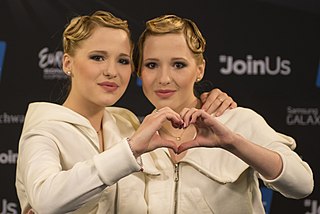Modal jazz is jazz that uses musical modes rather than tonal scales and thinking as a framework. Although precedents exist, modal jazz was crystallized as a theory by composer George Russell in his 1953 book Lydian Chromatic Concept of Tonal Organization.
Swing or swinging may refer to:

Music of Russia denotes music produced from Russia and/or by Russians. Russia is a large and culturally diverse country, with many ethnic groups, each with their own locally developed music. Russian music also includes significant contributions from ethnic minorities, who populated the Russian Empire, the Soviet Union and modern-day Russia.
John Alfred Mandel is a Grammy and Oscar-winning American composer and arranger of popular songs, film music and jazz. Among the musicians he has worked with are Count Basie, Frank Sinatra, Peggy Lee, Anita O'Day, Barbra Streisand, Tony Bennett, Diane Schuur and Shirley Horn.
The music of the Cayman Islands, a Caribbean island chain, includes a wide selection of international pop music as well as unique folk styles. The Cayman National Cultural Foundation, established in 1984, helps to preserve and promote Cayman folk music, including the organisation of festivals such as Cayman Islands International Storytelling Festival, the Cayman JazzFest, Seafarers Festival and Cayfest. There is also a Pirate's Week Festival. The Cayman JazzFest, founded in 2004, is a well-known jazz festival, that draws on the islands' "deep connection" with jazz.

Locksley Wellington "Slide" Hampton is an American jazz trombonist, composer and arranger. Described by critics as a master composer, arranger and uniquely gifted trombone player, Hampton's career is among the most distinguished in jazz. As his nickname implies, Hampton's main instrument is slide trombone, but he also occasionally plays tuba and flugelhorn.

Vitáliy Vladasovich Grachyov, known professionally as Vitas is a Russian singer. He is known for his unique falsetto and for possessing a near five-octave vocal range, which he displays when performing his "turkey call" in "The 7th Element" and his trademark falsetto choruses. His eclectic musical style incorporates elements of techno, dance, classical, jazz, and folk music. His song "Opera 2" and the music video for "The 7th Element" went viral across various social networks frequently, accounting for much of his worldwide recognition.

Leonid Osipovich Utyosov or Utesov ; real name Lazar (Leyzer) Iosifovich Vaysbeyn or Weissbein, was a famous Soviet jazz singer and comic actor of Jewish origin, who became the first pop singer to be awarded the prestigious title of People's Artist of the USSR in 1965.

The "Song of the Volga Boatmen" is a well-known traditional Russian song collected by Mily Balakirev, and published in his book of folk songs in 1866. It was sung by burlaks, or barge-haulers, on the Volga River. Balakirev published it with only one verse. The other two verses were added at a later date. Ilya Repin's famous painting Barge Haulers on the Volga depicts such burlaks in Tsarist Russia toiling along the Volga.

Mugham is one of the many folk musical compositions from Azerbaijan, contrasting with tasnif and ashiks.

Music of the Soviet Union varied in many genres and epochs. The majority of it was considered to be part of the Russian culture, but other national cultures from the Republics of the Soviet Union made significant contributions as well. The Soviet state supported musical institutions, but also carried out content censorship. According to Lenin, "Every artist, everyone who considers himself an artist, has the right to create freely according to his ideal, independently of everything. However, we are Communists and we must not stand with folded hands and let chaos develop as it pleases. We must systemically guide this process and form its result."
Gone with the Wind may refer to:

Russia first competed in the Junior Eurovision Song Contest in 2005. Their first win came in 2006, when the Tomachevy Twins won for Russia with "Vesenniy Jazz". Their second win came in 2017, when Polina Bogusevich won for Russia with "Wings". Their worst result as of date has been achieved by Anna Filipchuk with her song "Unbreakable" in the Junior Eurovision Song Contest 2018 where she placed 10th.

Anastasiya and Maria Andreyevna Tolmachevy are identical twin singers, actresses, and former child singers from the Russian city of Kursk. Aged nine, they won the Junior Eurovision Song Contest 2006 in Bucharest, Romania, with their song Vesenniy Jazz. Eight years later, they represented Russia at the Eurovision Song Contest 2014, placing seventh with the song "Shine".
NPR Music is a project of National Public Radio, an American privately and publicly funded non-profit membership media organization, that launched in November 2007 to present public radio music programming and original editorial content for music discovery. NPR Music offers current and archival podcasts, live concert webcasts, reviews, music lists, news, studio sessions, and interviews to listen to from NPR and partner public radio stations across the country, as well as an index of public radio music stations streaming live on the Internet. There are two blogs: "Monitor Mix" by Sleater-Kinney musician Carrie Brownstein and the All Songs Considered Blog by Bob Boilen and Robin Hilton.
This is a list of lists of musicians.
Barry Dean Kernfeld, is a musicologist and jazz saxophonist who has researched and published extensively about the history of jazz and the biographies of its musicians.
Ukraine initially intended to participate in the Eurovision Song Contest 2019. The Ukrainian broadcaster, UA:PBC, organised a national final in collaboration with the commercial broadcaster STB, in order to find the Ukrainian representative for the 2019 contest. Maruv emerged as the winner with the "Siren Song". Right after the show, it was announced that Maruv would sign a participation agreement, but she refused. On 25 February, UA:PBC officially announced Maruv's withdrawal and that they would select the representative via internal selection. On 27 February, UA:PBC announced the withdrawal of the country.










